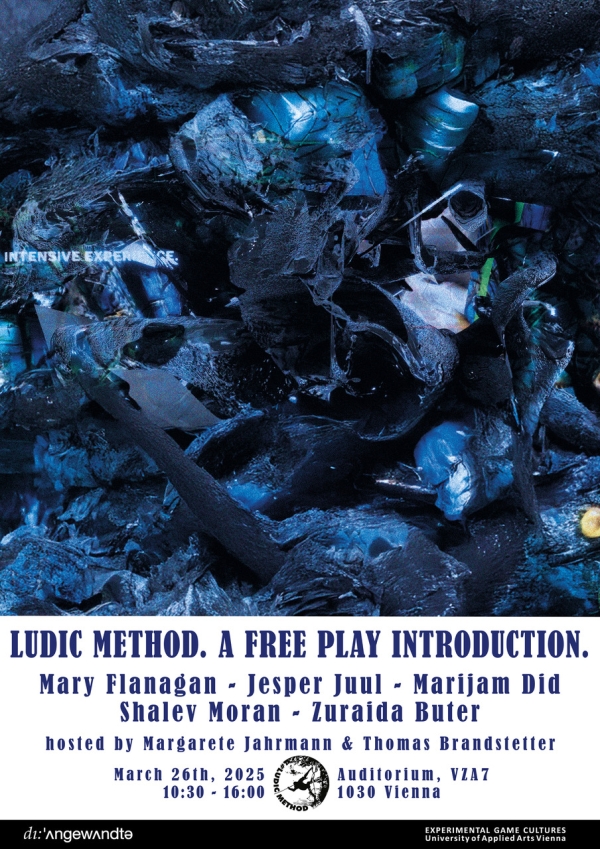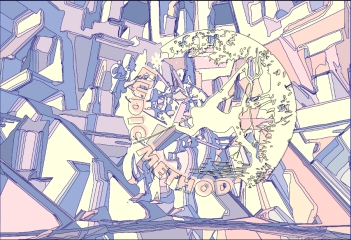DATE:
26.03.2025 PLACE: AUDITORIUM VZA 7 TIME: 10:30-16:00 ADDRESS: VORDERE ZOLLAMTSTRASSE 7, 1030 VIENNA
In
the Experimental Game Cultures study programme, in practical and theoretical work with students, we develop a method for taking
a closer look, a process and an understanding of the world — in multiperspectivity instead of abstraction. We are passionate
about the LUDIC METHOD: the game as a process that becomes socially relevant and effective. Internationally renowned speakers
and activists of play culture will provide insights into their activities and formulate contributions for a ‘Handbook of the
Ludic Method’ in 2025.
Opening words: Vice Rector Brigitte Felderer
Introduction:
Margarete Jahrmann, Head Experimental Game Cultures
The symposium will bring together contributions
to the Ludic Method, a principle introduced in Experimental Game Cultures. The event will feature a diverse group of speakers
who will engage in a series of discussions on a range of topics, including ludic research practice, new insights into cooperative
and viable experimental game art, future society dynamics, artistic research, science and epistemic things, technologies and
key tools such as AI and deep dreaming, non-human and pataplay, gender, and cognitive sciences. These discussions will be
conducted in a playful "ludic" format, and the event will also contribute to a future PLAY BOOK.
The
disruptive concept of the "ludic method" builds on artistic experiences made in cultural public spaces and on the design of
rule-driven systems (games), which are then opened in processual forms of play and insight. It combines methodologies introduced
in scientific research and rule-driven systems, comparable to the magic circle of play, with the arts.
It
explores new paths of artistic research, experimental game, and arts, connecting to systemic and experimental thinking with
the socially relevant, in a "psycholudic approach", to contribute to a more balanced and democratic world.
The
aim of this ludic discourse is to develop new cultural techniques to continuously innovate game dynamics and methods of art
as research. The utilization of performative practice and installations, functioning as experimental systems, marks a progression
in ludic method research, leading to the creation of artistic artifacts as epistemic objects that facilitate a sustainable
flow of discourse.
Detailed Program:
10.30 - 11.00 Opening and Introduction
Brigitte Felderer and Margarete Jahrmann
11.00 - 11.45 Play our way out, play our way in: Speculative
Play (or speculative future play) in Dystopian Times Mary Flanagan
11.45 - 12.30 The Dystopia of
Play: Games, Freedom, and the Plague of Optimization Jesper Juul
12.30 - 13.15 Break
13.15
- 14.00 Everything To Play For. How Videogames are Changing the World Marijam Did
14.00 - 14.45
Limits And Demonstrations: Games Doing Politics Shalev Moran
14.45 - 15.00 break
15.00-15.45
Play in Practice: Exploring The Playful Arts Community Zuraida Buter
15.45-16.00 Closing remarks
Thomas Brandstetter & Margarete Jahrmann
Mary Flanagan
Play our way out, play our way in: Speculative Play (or speculative future play) in Dystopian Timeshttps://maryflanagan.comHow should artists and gamers respond in environmental and political crises?
Creative people
struggle to make a difference and see what is “worth it” in the face of daunting global challenges. Play, however, invites
us to initiate a profound shift from current norms and situations. This talk sets out playful challenges among social, ecological,
technical domains to make a radical departure from the status quo.
The common image of play and
games is one of wonderful freedom and open experimentation, yet there are also two recurring fears about the value of play.
The traditional fear is that playing is fundamentally frivolous. The newer fear is that playing leads players towards narrowminded
optimization, forgetting both beauty and human values as they descend into a purely rational state of mind. In this talk,
Jesper will tell a history of the value of play, as expressed in the history of video games, from arcade games to big-budget
titles, to casual games, and recent experimental indie games.
Jesper Juul
The Dystopia of Play: Games, Freedom, and the Plague of Optimizationhttps://www.jesperjuul.netThe common image of play and games is one of wonderful freedom and open experimentation, yet there are also two recurring
fears about the value of play. The traditional fear is that playing is fundamentally frivolous. The newer fear is that playing
leads players towards narrowminded optimization, forgetting both beauty and human values as they descend into a purely rational
state of mind. In this talk, Jesper will tell a history of the value of play, as expressed in the history of video games,
from arcade games to big-budget titles, to casual games, and recent experimental indie games.
Marijam
Did Everything To Play For. How Videogames are Changing the Worldhttps://www.marijamdid.com/The lecture will examine the political Efficacy of videogames - an under-examined sphere within the impactful games discourse.
How can they become political tools, with actual ability to drive real-world change beyond being mere signifiers? We will
critically analyse various games titles alongside case studies from other artistic media, in particular Fine Art, and will
compare the best practices and failures. By utilising learnings from thinkers such as Claire Bishop, Nicholas Bourriaud, Walter
Benjamin and Theodor Adorno this talk will challenge attendees to rethink what political engagement through play could look
like, and what it is not.
Shalev Moran Limits And Demonstrations: Games
Doing Politicshttps://www.shalevmoran.comGame designer and
multimedia artist Shalev Moran will present three of his previous videogame works, each tackling political realities in different
ways. From commercial titles to absolute indie, from engaging with old histories to ongoing current events.
The
presentation will examine different creative strategies in making "political" games, their potential, as well as their limitations.
Zuraida
Buter Play in Practice: Exploring The Playful Arts Communityhttps://www.z
o-ii.comOver the years independent game developers and playful artists from different fields have created alternative
ways of playing with the world, with games and with each other, bridging the worlds of art, technology, design and games.
Having been involved in several festivals and events over the years and connecting many artists Zuraida will take the audience
on a journey through several of these projects, festivals and works of playful artists encouraging new perspectives on playful
approaches.





